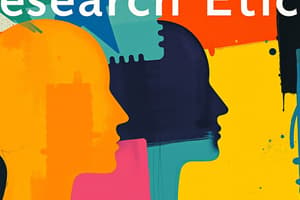Podcast
Questions and Answers
Ethics is solely concerned with financial success in life.
Ethics is solely concerned with financial success in life.
False (B)
Rules are fundamental for maintaining justice among social beings.
Rules are fundamental for maintaining justice among social beings.
True (A)
Non-moral standards include rules related to ethics and moral behavior.
Non-moral standards include rules related to ethics and moral behavior.
False (B)
Ethical individuals may find it easier to achieve inner peace compared to those who act unethically.
Ethical individuals may find it easier to achieve inner peace compared to those who act unethically.
Rules serve no real purpose in a functioning society.
Rules serve no real purpose in a functioning society.
Ethics is a branch of knowledge that only deals with financial success.
Ethics is a branch of knowledge that only deals with financial success.
Rules solely protect individuals from moral dilemmas.
Rules solely protect individuals from moral dilemmas.
Moral standards define actions considered morally right and wrong across different cultures.
Moral standards define actions considered morally right and wrong across different cultures.
Non-moral standards can be inherently linked to ethical considerations.
Non-moral standards can be inherently linked to ethical considerations.
According to ethical principles, generosity and truth-telling contribute to a stable society.
According to ethical principles, generosity and truth-telling contribute to a stable society.
Flashcards are hidden until you start studying
Study Notes
Ethics Overview
- Ethics is the study of moral principles guiding behavior and activities.
- Living ethically promotes authenticity, integrity, and commitment in personal and professional life.
Importance of Ethics
- Ethical individuals demonstrate success, possessing traits that unethical people may only feign.
- A focus on ethical behavior fosters inner peace, resulting in a more calm, focused, and productive life.
- Ethical societies are built on truthfulness, generosity, and the avoidance of harm, facilitating harmonious interactions.
- In some religious traditions, ethics are seen as vital for achieving personal success and contributing to social stability for eternal life.
Function of Rules
- Rules serve to protect individuals by establishing behavioral boundaries and limits.
- They guarantee guaranteed rights and freedoms, forming the foundational frameworks for societies, often encapsulated in constitutions.
- Rules contribute to a sense of justice by preventing powerful entities from exploiting the weak, ensuring fair treatment.
- Essential for a healthy economic system, rules prevent monopolies and encourage competitiveness within the market.
Moral vs. Non-Moral Standards
- Moral standards define beliefs about what actions are morally right or wrong, encapsulating moral values and principles.
- Non-moral standards are independent of ethical considerations, such as etiquette, fashion trends, game rules, and household regulations.
Ethics Overview
- Ethics is the study of moral principles guiding behavior and activities.
- Living ethically promotes authenticity, integrity, and commitment in personal and professional life.
Importance of Ethics
- Ethical individuals demonstrate success, possessing traits that unethical people may only feign.
- A focus on ethical behavior fosters inner peace, resulting in a more calm, focused, and productive life.
- Ethical societies are built on truthfulness, generosity, and the avoidance of harm, facilitating harmonious interactions.
- In some religious traditions, ethics are seen as vital for achieving personal success and contributing to social stability for eternal life.
Function of Rules
- Rules serve to protect individuals by establishing behavioral boundaries and limits.
- They guarantee guaranteed rights and freedoms, forming the foundational frameworks for societies, often encapsulated in constitutions.
- Rules contribute to a sense of justice by preventing powerful entities from exploiting the weak, ensuring fair treatment.
- Essential for a healthy economic system, rules prevent monopolies and encourage competitiveness within the market.
Moral vs. Non-Moral Standards
- Moral standards define beliefs about what actions are morally right or wrong, encapsulating moral values and principles.
- Non-moral standards are independent of ethical considerations, such as etiquette, fashion trends, game rules, and household regulations.
Studying That Suits You
Use AI to generate personalized quizzes and flashcards to suit your learning preferences.




